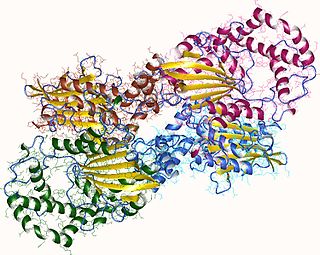| phosphonoacetate hydrolase | |||||||||
|---|---|---|---|---|---|---|---|---|---|
 Structure of phosphonoacetate hydrolase. PDB entry 1e16 . Zinc ions and phosphonoformate are shown in the active site. | |||||||||
| Identifiers | |||||||||
| EC no. | 3.11.1.2 | ||||||||
| CAS no. | 153570-68-4 | ||||||||
| Databases | |||||||||
| IntEnz | IntEnz view | ||||||||
| BRENDA | BRENDA entry | ||||||||
| ExPASy | NiceZyme view | ||||||||
| KEGG | KEGG entry | ||||||||
| MetaCyc | metabolic pathway | ||||||||
| PRIAM | profile | ||||||||
| PDB structures | RCSB PDB PDBe PDBsum | ||||||||
| Gene Ontology | AmiGO / QuickGO | ||||||||
| |||||||||
In enzymology, a phosphonoacetate hydrolase (EC 3.11.1.2) is an enzyme that catalyzes the chemical reaction
Contents
- phosphonoacetate + H2O acetate + phosphate
Thus, the two substrates of this enzyme are phosphonoacetate and H2O, whereas its two products are acetate and phosphate.
This enzyme belongs to the family of hydrolases, specifically those acting on carbon-phosphorus bonds. The systematic name of this enzyme class is phosphonoacetate phosphonohydrolase. This enzyme participates in aminophosphonate metabolism. It employs one cofactor, zinc.


